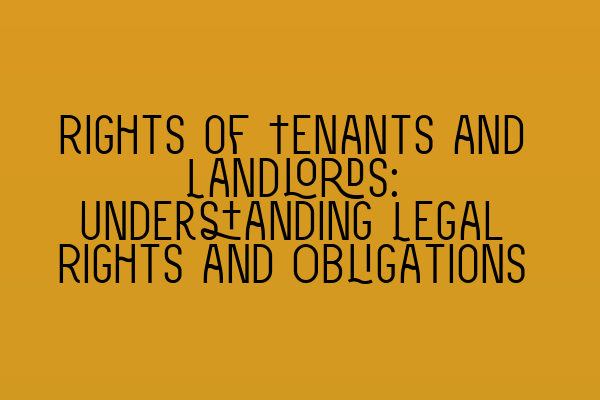Rights of Tenants and Landlords: Understanding Legal Rights and Obligations
Renting a property is a common arrangement for countless individuals and businesses. Whether you’re a tenant looking for a place to call home or a landlord hoping to generate income from your property, it’s crucial to understand the legal rights and obligations that govern the landlord-tenant relationship. This article will provide an overview of key rights and obligations for both tenants and landlords, offering valuable insights that can help you navigate the intricacies of property law.
Tenants’ Rights and Obligations
Right to Habitability
All tenants have the right to live in a safe and habitable property. This means that landlords are responsible for ensuring that the property meets basic standards of cleanliness, maintenance, and safety. For example, the property should have proper heating, plumbing, and electrical systems. If a landlord fails to maintain a habitable property, a tenant may have legal grounds to request repairs or terminate the tenancy.
Right to Privacy
Tenants have a right to privacy in their rental property. Landlords should provide advance notice before entering the property, except for emergencies. This gives tenants the ability to enjoy their personal space without undue intrusion. However, landlords may have the right to enter the property for necessary inspections, repairs, or showings to prospective tenants. It’s important for tenants to understand their rights to privacy and be aware of any exceptions that may apply.
Obligation to Pay Rent
Tenants have a legal obligation to pay rent in accordance with the terms of their lease or rental agreement. Failure to pay rent can result in eviction and legal consequences. It’s crucial for tenants to carefully review their lease and ensure they understand the rental payment terms, including due dates, acceptable payment methods, and any late fees. If circumstances arise that make it difficult for a tenant to meet their rental obligations, they should communicate with their landlord as soon as possible to explore potential solutions.
Right to Security Deposit
Many landlords require tenants to provide a security deposit at the start of the tenancy. The purpose of the security deposit is to protect the landlord against any unpaid rent or damage caused by the tenant. However, tenants have the right to the return of their security deposit, minus any legitimate deductions, after the tenancy ends. Landlords must provide a written explanation of any deductions and return the remaining deposit within a specific timeframe, as mandated by local laws.
Obligation to Maintain the Property
Tenants also have an obligation to maintain the property they are renting. This includes keeping the property clean, not causing damage beyond normal wear and tear, and promptly reporting any maintenance or repair issues to the landlord. Failing to fulfill these responsibilities can result in financial liability or possible eviction.
For more information on tenants’ rights and obligations, you can check out our related article on SQE 1 Practice Exam Questions.
Landlords’ Rights and Obligations
Right to Rent Payment
Landlords have the right to receive timely rent payments as agreed upon in the lease or rental agreement. Non-payment or late payment of rent can lead to eviction actions. By collecting rent, landlords can ensure the profitability of their investment and cover the costs associated with property maintenance and mortgage payments, if applicable.
Obligation to Provide Safe and Habitable Property
Landlords are responsible for providing tenants with a safe and habitable property. This includes complying with building codes, maintaining essential utilities, and addressing any necessary repairs promptly. Failure to fulfill these obligations can result in legal action or financial penalties.
Right to Screen Tenants
One essential right of landlords is the ability to screen potential tenants before entering into a rental agreement. Tenant screening helps landlords assess the likelihood of receiving timely rent payments and reduces the risk of property damage or lease violations. Landlords may perform background checks, credit checks, and request references to make informed decisions about prospective tenants.
Obligation to Return Security Deposit
Just as tenants have the right to the return of their security deposit, landlords have an obligation to return the deposit, minus any legitimate deductions, within the specified timeframe. Landlords must provide tenants with a written explanation of any deductions made, accompanied by receipts or documentation.
Right to Terminate Tenancy for Cause
If a tenant breaches the terms of the lease or fails to fulfill their obligations, landlords have the right to terminate the tenancy. Common causes for termination include non-payment of rent, excessive property damage, or illegal activities on the premises. However, landlords must follow the proper legal procedures and provide tenants with proper notice before evicting them.
To learn more about landlords’ rights and obligations, you may find our related article on SQE 1 Practice Mocks FLK1 FLK2 helpful.
Conclusion
Understanding the legal rights and obligations of both tenants and landlords is essential for maintaining a positive and lawful landlord-tenant relationship. By being well-informed about your rights and responsibilities, you can navigate the complexities of property law with confidence. Remember to consult with a qualified solicitor if you have any specific legal questions or concerns regarding your tenancy or rental property.
For more information on property law and legal topics related to landlords and tenants, feel free to explore our SQE 2 Preparation Courses and SQE 1 Preparation Courses. You can also visit the official website of the Solicitors Regulation Authority (SRA) for the latest SRA SQE Exam Dates.
